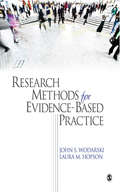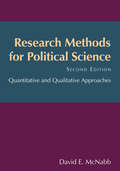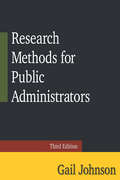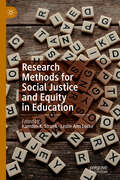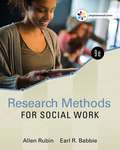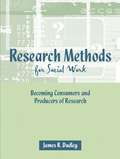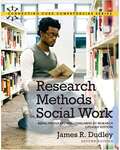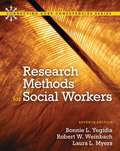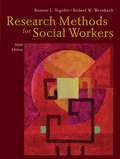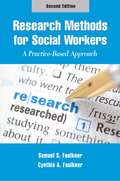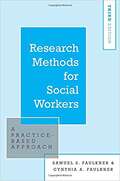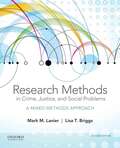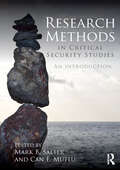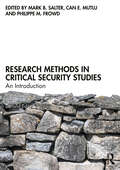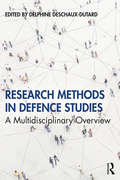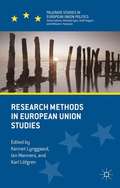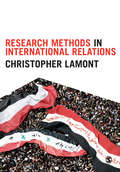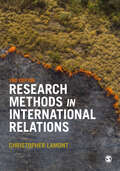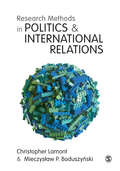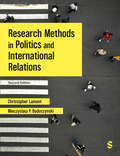- Table View
- List View
Research Methods for Environmental Studies: A Social Science Approach
by Mark KanazawaThe methodological needs of environmental studies are unique in the breadth of research questions that can be posed, calling for a textbook that covers a broad swath of approaches to conducting research with potentially many different kinds of evidence. Fully updated to address new developments such as the effects of the internet, recent trends in the use of computers, remote sensing, and large data sets, this new edition of Research Methods for Environmental Studies is written specifically for social science-based research into the environment. This revised edition contains new chapters on coding, focus groups, and an extended treatment of hypothesis testing. The textbook covers the best-practice research methods most used to study the environment and its connections to societal and economic activities and objectives. Over five key parts, Kanazawa introduces quantitative and qualitative approaches, mixed methods, and the special requirements of interdisciplinary research, emphasizing that methodological practice should be tailored to the specific needs of the project. Within these parts, detailed coverage is provided on key topics including the identification of a research project, hypothesis testing, spatial analysis, the case study method, ethnographic approaches, discourse analysis, mixed methods, survey and interview techniques, focus groups, and ethical issues in environmental research. Drawing on a variety of extended and updated examples to encourage problem-based learning and fully addressing the challenges associated with interdisciplinary investigation, this book will be an essential resource for students embarking on courses exploring research methods in environmental studies.
Research Methods for Evidence-Based Practice
by John S. Wodarski Laura HopsonThis practical and student-friendly text teaches social work students the concepts and skills needed to apply research methods in their practice with clients. It offers students an enhanced understanding of the research process, and equips them with the necessary tools and skills to evaluate studies, translate relevant behavioral science knowledge into practice principles, and implement evaluation procedures in their daily practice. Renowned authors Wodarski and Hopson use social work research methods to examine emerging issues in the field as they pertain to evidence-based practice, such as curriculum development and funding. This approach yields a unique analysis that differs from others on the market because it fully integrates evidence-based practice methodology into the heart of the text, rather than in a single chapter.
Research Methods for Political Science: Quantitative and Qualitative Methods
by David E McNabbThoroughly updated, more concise than the previous edition, and available for the first time in paperback, "Research Methods for Political Science" is designed to help students learn what to research, why to research, and how to research. The text integrates both quantitative and qualitative approaches to research in one volume, and includes the most comprehensive coverage of qualitative methods currently available. It covers such important topics as research design, specifying research problems, designing questionnaries and writing questions, designing and carrying out qualitative research, and analyzing both quantitative and qualitative research data. Heavily illustrated, classroom tested, and exceptionally readable and engaging, the text also provides specific instructions on the use of available statistical software programs such as Excel and SPSS.
Research Methods for Public Administrators: Third Edition
by Gail JohnsonAs in previous editions, this highly practical book is written with beginning MPA students and practitioners in mind. It focuses on the interpretation and use of research findings, not just number crunching. It covers the entire research process, from initial questions to final report, in clear, jargon-free language, and includes numerous easy-to-understand examples and exercises that provide opportunities for concrete applications of the concepts. It is solidly grounded in public administration and recognizes both the promise and limitations of research within a political environment.Key features of the book:--It is highly practical and written to accommodate a mix of readers: those who want to become analysts, managers who will oversee research contracts, and citizens who need to know whether to believe the facts and data they read in today's news;--It minimizes the use of jargon and explains difficult concepts in clear language. Plentiful end-of-chapter exercises provide opportunities for concrete application of the concepts;--Key points are highlighted as "takeaway lessons" so readers are reminded about what really matters. The tough questions to ask are suggested in every chapter;--Examples and applications are used throughout the book to illustrate concepts and add topical interest;--It covers the entire research process, from initial questions to the final report. This book demystifies and makes practical the research every public administrator and policy analyst needs to do the job well. Online instructor's materials, including a Test Bank, PowerPoint slides, and a Survey and Documental Analysis (SDA) guide, are also available to adopters.
Research Methods for Social Justice and Equity in Education
by Kamden K. Strunk Leslie Ann LockeThis textbook presents an integrative approach to thinking about research methods for social justice. In today's education landscape, there is a growing interest in scholar-activism and ways of doing research that advances educational equity. This text provides a foundational overview of important theoretical and philosophical issues specific to this kind of work in Section I. In Section II, readers engage with various ways of thinking about, collecting, and analyzing data, including qualitative, quantitative, and mixed methods approaches. Finally, in Section III, through case studies and research narratives, readers will learn about real scholars and their work. This book takes a wide-ranging approach to ways that various modalities and practices of research can contribute to an equity mission.
Research Methods for Social Work (6th edition)
by Allen Rubin Earl R. BabbieRubin (social work, U. of Texas at Austin) and Babbie (Chapman U.) have increased their coverage of evidence-based practice and reorganized materials to more closely reflect current typical procedures in this practical guide to gathering and analyzing data. They approach social work research as a science but also thoroughly describe the human side, including the ethics and politics of social work research and culturally competent research. Step by step they show such processes as formulating problems, determining measurements, choosing designs for evaluating programs and practice, collecting large sources of data, using qualitative research methods, analyzing quantitative data, and writing research proposals and reports. They include very helpful appendices on using the library, statistically estimating sampling error, and using SPSS 11.0 for Windows.
Research Methods for Social Work (Empowerment)
by Allen Rubin Earl R. BabbieWidely considered the best text for the course, RESEARCH METHODS FOR SOCIAL WORK, Seventh Edition strikes an optimal balance of quantitative and qualitative research techniques--illustrating how the two methods complement one another. Allen Rubin and Earl R. Babbie’s classic bestseller is acclaimed for its depth and breadth of coverage as well as the authors’ clear and often humorous writing style. Combining a rigorous and comprehensive presentation of all aspects of the research endeavor with a thoroughly reader-friendly approach helps students overcome the fear-factor often associated with this course. Relevant examples from real-world settings consistently help students see the connections between research and social work practice. In response to the move toward teaching evidence-based practice throughout the curriculum, the new edition also enhances coverage of evidence-based practice as well as keeps the text in line with other accreditation requirements based on the recently revised EPAS guidelines. Comprehensive, friendly, accurate, and integrating the best of technology, RESEARCH METHODS FOR SOCIAL WORK, 7e is an excellent text that can be used across undergraduate, graduate, and doctorate levels of study.
Research Methods for Social Work: Becoming Consumers and Producers of Research
by James R. DudleyResearch Methods for Social Work, 1e, is easy to read and understand yet fully covers all of the Council of Social Work Education accreditation standards. This is the perfect introduction to research methods for beginning social work students as well as instructors or professionals who do not usually conduct research. The topic of research is presented through the use of concepts that are relevant to Social Work practice as well as interesting and enjoyable to the reader. The role of critical consumer skills and technology in the practice of social work is stressed throughout. Illustrations, charts, graphs, and case vignettes are used in each chapter to reinforce concepts and enhance understanding.
Research Methods for Social Work: Being Producers and Consumers of Research (Connecting Core Competencies)
by James DudleyWith its practical and accessible writing style, Research Methods for Social Workers, second edition, offers numerous examples from the field of social work and emphasizes how research and social work practice are connected. CSWE-mandated areas of social work are emphasized. <p><p> With over 25 years of teaching research and social work practice course, the author understands first-hand how practice and research are connected and how vital they are to each other. <p><p> Each chapter reflects and integrates the core competencies in the 2008 Educational Policy and Accreditation Standards (EPAS) set by the Council on Social Work Education (CSWE). End-of-chapter assessment reinforces this integration, and MySocialWorkLab.com activities support the mastery of CSWE's core competencies.
Research Methods for Social Workers
by Bonnie L. Yegidis Robert W. Weinbach Laura L. MyersThis social work research methods text is written in an accessible, reader-friendly style and includes numerous examples of how research can be used to inform social work practice. It is part of the Connecting Core Competencies Series that integrates CSWE's core competencies and practice behaviors throughout.
Research Methods for Social Workers (6th edition)
by Bonnie L. Yegidis Robert W. WeinbachDesigned for a one-semester or one-quarter course on research methods, this text for undergraduate or beginning graduate students in social work prepares students to become critical consumers of research literature and to design and implement research. Part I places current research in historical context, and Part II centers on pre-data collection tasks. Part III looks at how questions are answered and how hypotheses are tested, and Part IV examines methods for evaluating practice effectiveness. Examples refer everyday social work situations. Yegidis is affiliated with the University of Georgia. Weinbach is affiliated with the University of South Carolina. Annotation c. Book News, Inc. , Portland, OR (booknews. com)
Research Methods for Social Workers: A Practice Based Approach (Second Edition)
by Samuel S. Faulkner Cynthia A. FaulknerSamuel and Cynthia Faulkner have developed the perfect research methods text tailored specifically for social work students that illustrates how understanding research is valuable for success in evidence-based agency practice. From the basics of research to practice evaluation, the authors carefully guide students through the complete process. They are able to connect abstract theory with practical applications, providing the skills necessary to become effective practitioners. The book introduces complex concepts such as qualitative, quantitative, and statistical methods; ethical issues in research; sampling; and measurement in a manner that students find readily accessible. What is most impressive about this new edition is that there is an additional 30% of new or updated material. Developed in part from suggestions made by students and faculty who have used the previous edition, these improvements include content and instructional features that will remind you why this is one of the best research methods books on the market! Features: NEW CSWE Core Competencies at the beginning of each chapter. NEW Practice exam at the end of each chapter. NEW! Case scenarios in each chapter demonstrating practical use of material along with associated critical thinking questions. NEW! Survey research chapter illustrating how to develop and conduct survey instruments. NEW! Example research proposal and example research report demonstrating how research is effectively gathered, processed, and presented. NEW! Examples throughout the text relating to social work practice.
Research Methods for Social Workers: A Practice-Based Approach
by Samuel S. Faulkner Cynthia A. FaulknerFrom the outset, the ultimate goal of Research Methods for Social Workers has been to serve as a research text that students would be able to understand and read in full. This third edition features important additions and changes to the original text (while maintaining its accessible style). <p><p> The order of chapters is re-arranged to improve the flow of introducing and developing concepts of the research process, and the authors have included some much-needed information to meet the changing and evolving standards of social work education. At its core, this book is designed to bring complex ideas down to a level that can be grasped by someone with little to no knowledge of research methods - it is an invaluable resource for social work students and anyone who wishes to have a comprehensive introduction to research methods.
Research Methods in Crime, Justice, and Social Problems: A Mixed Methods Approach
by Mark M. Lanier Lisa T. BriggsIntuitive, accessible, and filled with real-world testimonials from criminal justice scholars, Research Methods in Criminal Justice and Criminology: A Mixed Methods Approach, Second Edition, gives students the tools they need to understand the research they read and take the first steps toward producing compelling research projects themselves. Featuring a step-by-step organization that follows the stages of a research project, it emphasizes the actual experience of conducting research and includes a wealth of examples. The text is enhanced by robust pedagogy including chapter objectives, key terms, a running glossary, and chapter-ending discussion questions.
Research Methods in Critical Security Studies: An Introduction
by Mark B. Salter Can E. MutluThis new textbook surveys new and emergent methods for doing research in critical security studies, thereby filling a large gap in the literature of this emerging field. New or critical security studies is growing as a field, but still lacks a clear methodology; the diverse range of the main foci of study (culture, practices, language, or bodies) means that there is little coherence or conversation between these four schools or approaches. In this ground-breaking collection of fresh and emergent voices, new methods in critical security studies are explored from multiple perspectives, providing practical examples of successful research design and methodologies. Drawing upon their own experiences and projects, thirty-three authors address the following turns over the course of six comprehensive sections: Part I: Research Design Part II: The Ethnographic Turn Part III: The Practice Turn Part IV: The Discursive Turn Part V: The Corporeal Turn Part VI: The Material Turn This book will be essential reading for upper-level students and researchers in the field of critical security studies, and of much interest to students of sociology, ethnography and IR. ? ?
Research Methods in Critical Security Studies: An Introduction
by Mark B. Salter, Can E. Mutlu and Philippe M. FrowdThis textbook surveys new and emergent methods for doing research in critical security studies, filling a gap in the literature. The second edition has been revised and updated. This textbook is a practical guide to research design in this increasingly established field. Arguing for serious attention to questions of research design and method, the book develops accessible scholarly overviews of key methods used across critical security studies, such as ethnography, discourse analysis, materiality, and corporeal methods. It draws on prominent examples of each method’s objects of analysis, relevant data, and forms of data collection. The book’s defining feature is the collection of diverse accounts of research design from scholars working within each method, each of which is a clear and honest recounting of a specific project’s design and development. This second edition is extensively revised and expanded. Its 33 contributors reflect the sheer diversity of critical security studies today, representing various career stages, scholarly interests, and identities. This book is systematic in its approach to research design but keeps a reflexive and pluralist approach to the question of methods and how they can be used. The second edition has a new forward-looking conclusion examining future research trends and challenges for the field. This book will be essential reading for upper-level students and researchers in the field of critical security studies, and of much interest to students in International Relations and across the social sciences.
Research Methods in Defence Studies: A Multidisciplinary Overview
by Delphine Deschaux-DutardThis textbook provides an overview of qualitive and quantitative methods used in different social sciences to investigate defence issues.Recently, defence issues have become of increasing interest to researchers in the social sciences, but they raise specific methodological questions. This volume intends to fill a gap in the literature on defence studies by addressing a number of topics not dealt with sufficiently before. The contributors offer a range of methodological reflections and tools from various social sciences (political science, sociology, geography, history, economics and public law) for researching defence issues. They also address the increasingly important question of data and digitalization. The book introduces the added value of quantitative and qualitative methods, and calls for a cross-fertilization of methods in order to facilitate better research on defence topics and to fully grasp the complexity of defence in the 21st century.This book will be of much interest to students, researchers and practitioners of defence studies, war studies, military studies, and social science research methods in general.
Research Methods in European Union Studies
by Kennet Lynggaard Ian Manners Karl L�fgrenResearch on the European Union over the past few years has been strongly implicated in the crises that currently grip Europe with a failure to ask the pertinent questions as well as a perceived weakness in the methods and evidence used by researchers providing the basis for these allegations. This volume moves the study of EU research strategies beyond the dichotomies of the past towards a new agenda for research on Europe through a rich diversity of problem-solving based research. This new agenda acknowledges the weaknesses of the past and moves beyond them towards greater openness and awareness of the importance of research strategies, designs and methods. The 20 chapters in this collection range from micro-level analyses of identities, single policy studies and European discourse, through meso-level analysis of agenda setting, bargaining, implementation and Europeanisation, to macro-level analyses of the EU as a global actor, European integration and globalisation as well as hard and soft governance, elections and party groups, attitude formation, and new-regionalism. As such, it provides a comprehensive and accessible guide to conducting research on the European Union today.
Research Methods in International Relations
by Christopher LamontThis book guides you through the entirety of the research process in International Relations, from selecting a research question and reviewing the literature to field research and writing up. Covering both qualitative and quantitative methods in IR, it offers a balanced assessment of the key methodological debates and research methods within the discipline. The book: Is specifically focussed on research methods used in International Relations. Spans the entire research process from choosing a research question to writing up. Provides practical research methods guidance. Introduces you to broader methodological debates and brings together contemporary research from empirical and interpretive traditions. Is packed with examples and suggestions for further reading. Research Methods in International Relations is essential reading for both undergraduate and postgraduate students taking Research Methods courses in International Relations, Politics, Security and Strategic Studies.
Research Methods in International Relations
by Christopher LamontThis book guides you through the entirety of the research process in International Relations, from selecting a research question and reviewing the literature to field research and writing up. Covering both qualitative and quantitative methods in IR, it offers a balanced assessment of the key methodological debates and research methods within the discipline. The book: Is specifically focussed on research methods used in International Relations. Spans the entire research process from choosing a research question to writing up. Provides practical research methods guidance. Introduces you to broader methodological debates and brings together contemporary research from empirical and interpretive traditions. Is packed with examples and suggestions for further reading. Research Methods in International Relations is essential reading for both undergraduate and postgraduate students taking Research Methods courses in International Relations, Politics, Security and Strategic Studies.
Research Methods in International Relations
by Christopher LamontThe only guide to conducting research in International Relations. Covering the full breadth of methods in IR with unrivalled clarity, this best-selling textbook takes you through the entire process of doing research, from honing your question to writing up the dissertation. The engaging and jargon-free style demystifies the process of doing research, whilst helping you develop a comprehensive understanding of the strengths and limitations of different methods and methodologies. This second edition comes with new chapters on conducting interviews and discourse analysis, as well as expanded coverage of qualitative and quantitative methods. Packed with examples, it explores the breadth of IR research today, from the long-lasting impact of colonialism to migration policy; climate change negotiations to international aid. Covering the most cutting-edge methodological developments, including critical realism, feminist, and postcolonial approaches, it helps you understand and apply research methods in world politics. This practical introduction is essential reading for anyone setting out on their International Relations research project for the first time, at undergraduate and postgraduate levels. Christopher Lamont is Assistant Dean of E-Track Programs and Associate Professor of International Relations at Tokyo International University, Japan.
Research Methods in International Relations
by Christopher LamontThe only guide to conducting research in International Relations. Covering the full breadth of methods in IR with unrivalled clarity, this best-selling textbook takes you through the entire process of doing research, from honing your question to writing up the dissertation. The engaging and jargon-free style demystifies the process of doing research, whilst helping you develop a comprehensive understanding of the strengths and limitations of different methods and methodologies. This second edition comes with new chapters on conducting interviews and discourse analysis, as well as expanded coverage of qualitative and quantitative methods. Packed with examples, it explores the breadth of IR research today, from the long-lasting impact of colonialism to migration policy; climate change negotiations to international aid. Covering the most cutting-edge methodological developments, including critical realism, feminist, and postcolonial approaches, it helps you understand and apply research methods in world politics. This practical introduction is essential reading for anyone setting out on their International Relations research project for the first time, at undergraduate and postgraduate levels. Christopher Lamont is Assistant Dean of E-Track Programs and Associate Professor of International Relations at Tokyo International University, Japan.
Research Methods in Politics and International Relations
by Christopher Lamont Mieczyslaw BoduszynskiThis is the perfect guide to conducting a research project in Politics and International Relations. From formulating a research question and conducting a literature review to writing up and disseminating your work, this book guides you through the research process from start to finish. The book: - Is focused specifically on research methods in Politics and IR - Introduces the central methodological debates in a clear, accessible style - Considers the key questions of ethics and research design - Covers both qualitative and quantitative approaches - Shows you how to choose and implement the right methods in your own project The book features two example research projects – one from Politics, one from International Relations– that appear periodically throughout the book to show you how real research looks at each stage of the process. Packed full of engaging examples, it provides you with all you need to know to coordinate your own research project in Politics and International Relations.
Research Methods in Politics and International Relations
by Christopher Lamont Mieczyslaw BoduszynskiThis is the perfect guide to conducting a research project in Politics and International Relations. From formulating a research question and conducting a literature review to writing up and disseminating your work, this book guides you through the research process from start to finish. The book: - Is focused specifically on research methods in Politics and IR - Introduces the central methodological debates in a clear, accessible style - Considers the key questions of ethics and research design - Covers both qualitative and quantitative approaches - Shows you how to choose and implement the right methods in your own project The book features two example research projects – one from Politics, one from International Relations– that appear periodically throughout the book to show you how real research looks at each stage of the process. Packed full of engaging examples, it provides you with all you need to know to coordinate your own research project in Politics and International Relations.
Research Methods in Politics and International Relations
by Christopher Lamont Mieczyslaw P. BoduszynskiThe most practical guide to conducting research in Politics and International Relations. This textbook sets out how to approach every stage of your research project, from formulating a research question and research design, to detailed guidance on using specific methods and writing up your paper. Packed with practical tips throughout, this second edition: •Offers a troubleshooting feature to help you with the most common blockages and questions at each stage of the process •Has unrivalled coverage, with brand-new chapters on all the key methods used in Politics and IR, from discourse analysis and interviews to descriptive and inferential statistics. •Engages with some of the most cutting-edge research with examples spanning current issues from climate change to great power competition. •Helps you engage with theory in your research project, with a standalone chapter mapping theoretical perspectives and how to engage with theory successfully in your research. •Is immersed in practical application with two "Research in Practice" features running throughout the book to show methods in practice. Lamont and Boduszynski’s new book is eminently readable and designed for all students of Politics and IR, whether on an introductory methods course or undertaking a research project. Christopher Lamont is Dean of E-Track’s International Relations program and Vice Dean of the Graduate School of International Relations at Tokyo International University in Japan. Mieczyslaw P. Boduszynski is Associate Professor of Politics and International Relations at Pomona College in California, USA.

